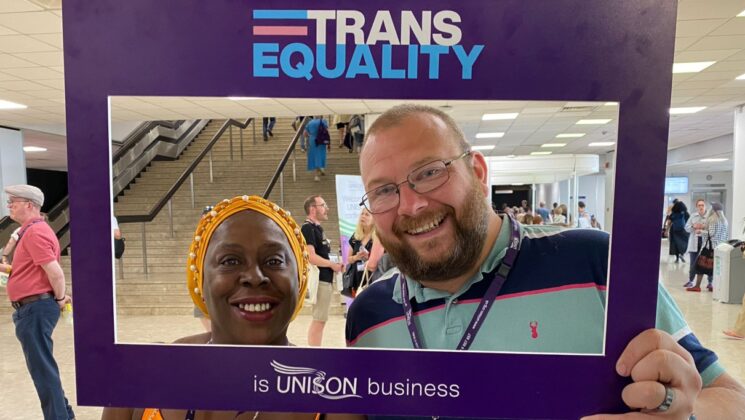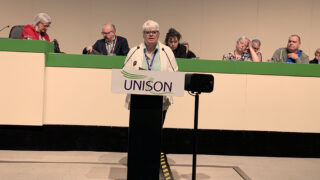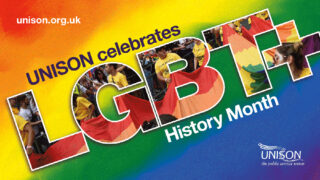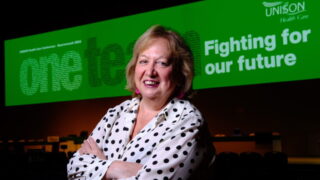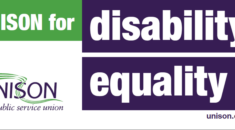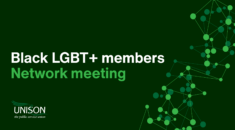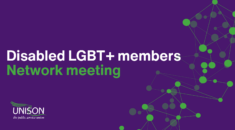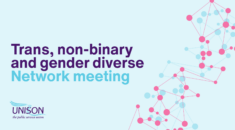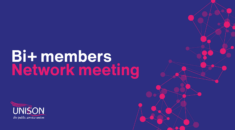At the 2022 local government and national delegate conferences, UNISON unanimously passed motions on trans equality, recognising the importance of the union being loud and visible in support of its trans members.
On Friday 15 July, UNISON launched its trans equality campaign, which features updated guidance on trans workers’ rights.
The campaign has four objectives:
• to roll out trans ally training across all UNISON regions;
• to build trans and non-binary member activism to organise and campaign on workplace issues;
• to ensure workplaces are safe by adopting UNISON’s model trans policy; and
• to fight to make sure UNISON’s activism is heard by politicians.
UNISON North Tyneside branch chair and equalities and LGBT+ officer Jenny Black said: “In the Tory leadership campaign, all 11 candidates had ‘trans issues’ as part of their agenda. Yet statistics show for the general population, it’s not an issue. Trans people make up 0.6% of the population”.
Despite Westminster’s fixation on trans people, a YouGov poll found last week that two thirds of Britons say they pay little attention (42%) or no attention (24%) to the debate in the media and politics about trans rights.
In her speech at the campaign launch in London on Friday 15 July, Ms Black said: “The toxic rhetoric makes life really difficult for a lot of trans people at the moment, some of us have got thick skin and are hardened to it, but it still gets through.
“We need to be louder and prouder, and tell the truth about the stigma that we face.”
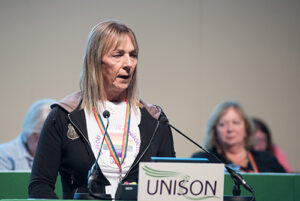
Jenny Black speaking on behalf of UNISON’s LGBT+ group at national delegate conference in 2019
Ms Black continued: “Trans allyship training is really important because, while people may give a nod and say they understand trans issues, they don’t really understand because nobody’s really told them. It’s really important to give them information and direct them to the website, and let people ask questions in a safe space”.
Ms Black also spoke to the importance of simple workplace changes, like having pronouns on badges.
“We had a new director of HR start with us a few months ago, and I reached out to her to introduce myself. In her response to me, I saw she had her pronouns in her email. It made me feel comfortable that I could speak to her and that she wouldn’t question me. It’s amazing the signal that something as simple as pronouns send out to trans and non-binary people.
“There may be only 120 trans members in UNISON, but there are 1.3 million members behind us.”
Trans or transgender describes people whose gender identity differs from their sex assigned at birth. They are umbrella terms covering people who:
- are intending to undergo, are undergoing or have undergone gender reassignment at any stage;
- identify as having a gender different from that which they were assigned at birth and are planning to have or have had medical interventions such as hormones or surgery;
- identify as having a gender different from that which they were assigned at birth, but who are not planning any medical intervention; and/or,
- are non-binary – that is, they are not solely male or female. They may define themselves as both, neither or something entirely different. They may or may not have medical interventions to align their body with their non-binary gender identity.
Transitioning is the process undertaken by a trans person in order to bring their gender presentation into alignment with their gender identity. This often involves dressing differently, using a different name and pronoun (eg she, he or they) and changing official documentation. It may involve various types of medical or surgical treatment, although this is not the case for all trans people.
UNISON activist and former national women’s committee chair Emma Procter said: “If I hadn’t been a member of UNISON, I wouldn’t have transitioned. I am where I am now because of the people around me, the LGBT+ committee, trans network, national officers, colleagues and staff.
“I’ve always been transgender and coming to the network days early on I realised there was a space here for me. There was a safe space where I felt I belonged and I gradually got more and more involved. I eventually became co-chair of the trans caucus, and then deputy convenor for the East Midlands region.

Emma Procter
“I transitioned relatively late in life, in my 50s, but in UNISON it doesn’t matter. I’m listened to here. UNISON gave me the confidence I have now – 20 years ago I was so shy. My journey through the union all started with the trans network.
“I don’t need allies to speak for me, because I can fight my own battle. But allies are really important within spaces where I’m not there, and for speaking up on behalf of trans people when we can’t. Allies don’t stand in front of us, or too far behind us, we stand side by side and we watch each other’s backs.”
At the 2021 LGBT+ conference, UNISON general secretary Christina McAnea said: “I have never felt, as a woman, that my rights were threatened by giving rights to transgender women”.
UNISON convenor for Devon County Council Darienne Flemington, former co-chair of UNISON’s LGBT+ group, is a proud trans ally. She said: “Trans rights are human rights. All members in our union should be supported by our union, and in the wider community and workplace, trans people are isolated.
“UNISON has a number of great fact sheets around supporting LGBT people, like the using pronouns fact sheet, but our stewards and members are not using them in the way they could.
“This campaign is about raising the visibility of UNISON’s resources about how to support trans members in the workplace.
There are little things that make a huge difference: for example, in the police and justice sector, implementing flexible uniform policies for when people are transitioning, or making sure that absences that trans workers take for treatments and interventions aren’t counted as sickness.”
“What people realise is that, when someone transitions, they’re still the same person, they’re just happier.”
If you want any further information about the trans equality campaign, get in touch with the national LGBT+ team via out@unison.co.uk
If you don’t have a trans equality policy in your workplace, get your branch to negotiate UNISON’s trans equality model policy found here.

